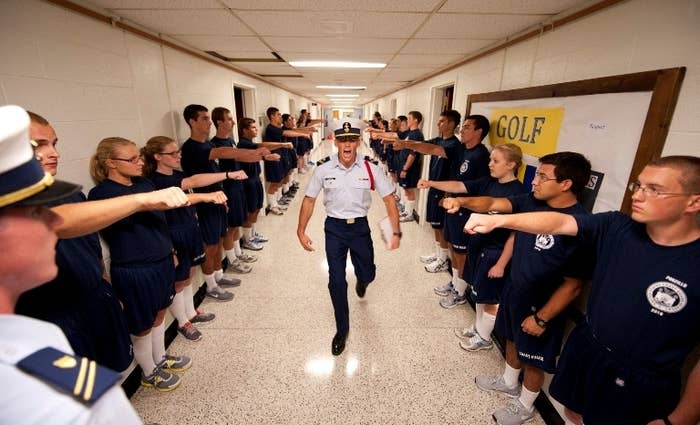
Administrators and faculty at the five United States service academies are bracing themselves for the impending government shutdown, which stands to disrupt the education of thousands of cadets and midshipmen across the country. Mandatory across-the-board spending cuts imposed by sequestration have already taken a toll on the academies so far this year, forcing cutbacks to student services, extracurricular activities, and, in the case of the Naval Academy, classes. Now, if the government shutdown goes into effect, the majority of civilian employees at the academies — including non-military faculty members — will be forced to stay at home until Congress passes a budget.
The Merchant Marine Academy, which is funded through the Department of Transportation and has no direct connection to any branches of the military, will cease all operations in the event of a government shutdown. Although a representative from the USMMA declined to comment on the imminent federal funding hiatus, the Department of Transportation's contingency plan, dated Sept. 27, 2013, confirms that such a shutdown would force the academy to stop all classes. "Under a short-term shutdown, midshipmen would remain at the USMMA, but they would not attend classes," the plan states. "If a shutdown persisted over one week, then midshipmen would be sent home. Midshipmen at sea would remain at sea under a shutdown."
Classes and training will continue at the other four service academies. "We've done this dance before," Air Force Academy spokesman John Van Winkle told BuzzFeed. "There's a plan in place; we just may actually have to go through with it this time." Van Winkle said that 1,500 civilian employees would be furloughed if the government shut down, including 330 civilian faculty members and administrative support staff. "Military professors will step in," Van Winkle said, explaining that unaffected faculty members will double up classes to make up for the furloughed civilian teachers, which account for roughly 30% of the academy's instructors. "Our average class size is 20 people," Van Winkle said. "Even with 40 people in a class, if you compare that to other schools, we're still pretty well set." Although ancillary services such as the cadet library will be closed, the USAFA will attempt to make the cadets' studies as uninterrupted as possible. "There won't be extra time for homework," Van Winkle joked.
Naval Academy spokeswoman Jennifer Erickson confirmed that midshipmen would continue to attend classes in the event of a government shutdown, although she acknowledged that it might be necessary for some classes to be canceled. "USNA has an approximate 50/50 military to civilian instructor ratio and there will be circumstances where military instructors are not able to substitute for civilian professors in the classroom," Erickson said in an emailed statement. Arabic and Chinese language classes will be canceled, as will chemistry, engineering and physics laboratories. As far as other classes taught by civilians, Erickson explained, "Many instructors were able to pre-package 4-5 days' worth of classes in order for one of their military counterparts within the department to substitute and instruct the class in the event of the government shutdown."
A spokeswoman for the United States Military Academy at West Point stated that there were no plans to cancel classes or any cadet activities if the government shuts down. Although the USMA employs approximately 3,000 civilians, the majority of those who would be affected by the impending furloughs are not directly involved in the education of the cadets: "75% of our faculty is military, so our students won't be affected," the spokeswoman confirmed.
As the smallest of the five service academies, the Coast Guard Academy stands to be the least affected by the possible shutdown. "We don't expect interruptions to the regular class schedule," Coast Guard spokesman Carlos Diaz said via email. The USCGA, which is funded through the Department of Homeland Security as opposed to the Department of Defense, employs 125 faculty members. Although he could not provide an exact number, Diaz confirmed that "the majority" of the academy's civilian instructors would be exempt from furloughs under the DHS Federal Funding Hiatus Contingency Plan.

